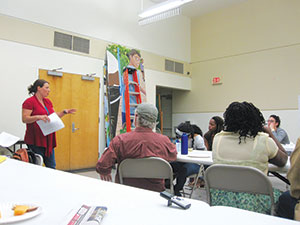
Food accessibility was the staple ingredient at SCC’s community meeting held last Thursday at the Mystic Community Center. ~Photo by Douglas Yu
By Douglas Yu
In order to make the best use of the land resources, Somerville Community Corporation (SCC), cooperating with Somerville residents and other community organizations, led a free discussion about land use in a food access context. That is, how we can look at public, private, open, vacant and inhabited space in Somerville to make more healthy, convenient grocery options available.
“Somerville is not entirely a food desert,” said Mashael Majid, Community Planner at SCC.
However, communities where there are not close by, walkable options for fresh, healthy groceries, but which may or may not be food deserts, are referred to as “food-insecure.”
John Cater, who lives on Broadway, brought up the difficulty of reaching the nearest chain grocery store.
“I get everything I need in grocery stores and I think this is especially important for old people,” Cater said. He explained that most youths grab a soda or water in the nearby convenience stores. Somerville is also a community where there is a large amount of senior citizens and people with disabilities. It is not convenient for them to go shopping often.
Even though there is a Stop & Shop on McGrath Highway in East Somerville, there is not a more affordable grocery store in this area, such as Market Basket. Some people even need to take a taxi to go shopping at a cheaper grocery store.
“I can’t afford a cab,” Cater said. “I always walk back from the grocery store with a push cart. If I take a cab, it would cost the money that I’m supposed to spend on food.”
Lexi Sasanow, A Tufts Tisch Scholar and SCC Intern at SCC said that, because Somerville was partly a food desert, it was a very “food-insecure” community.
“The Star Market on Broadway has been vacant for five years, so it takes a long time for Winter Hill Street residents to walk to the nearest grocery, especially for older and disabled people,” said Sasanow. “One of the questions is that the lack of public transit in some areas makes food more inaccessible.”
There has been a long conversation between SCC and Somerville residents about effective public transportation. In the last SCC meeting in July, people suggested shuttle buses to grocery stores, which is now one of the proposals.
These ideas came from 27 participants, many of which were youth from Teen Empowerment and Groundwork Somerville who were engaged in SCC’s data collecting project this summer. They took a survey about how much time they need to get back and forth between their homes and grocery stores, what their purchasing motivations are and how they feel about those stores.
“The whole project came out of a community process by starting off with the Gilman Square Neighborhood Association and SCC’s Land Use Committee,” Majid said. “The sample size is small, but they definitely helped collect more dynamic data.”
Unlike many demographic data from U.S. Census, the information that SCC used to help them to create a community action plan is more current.
People who attended the SCC meeting also commented on the charts made with the survey data.
Rachael Plitch, Shape Up Somerville (SUS) Coordinator, thought these data were very helpful to people to grasp an understanding of food accessibility in Somerville. SUS launched Mobile Farmers Market in June 2011. The initiative is collaboration between Shape Up Somerville and many varied and significant partners, including Groundwork Somerville, The welcome Project, Somerville Housing Authority, and Enterprise Farm. It became very important to local residents when Star Market shut down.
Sasanow said that a potential next step is to talk to land owners, developers to implement practical solutions.
These surveys about food accessibility are actually applied to many other kinds of land use, Majid said. Since more and more small businesses are introduced to Somerville this year, making use of the limited areas effectively influences many people’s lives.
Kathleen O’Brien is one of the students from Tufts University who started the survey, saying that she was surprised to see that people’s purchasing motivation was price instead of convenience. One of the people at the meeting pointed out that people come from all over the area to buy all of their groceries because the Somerville Market Basket is one of the most affordable sites in the whole Boston metro area.
“We are hoping that there will be something central to the neighborhood to provide healthy food, like a food co-op or a community kitchen,” Majid said. “But we’ll have to further engage the neighborhood to come up with long-term sustainable solutions.”















Reader Comments